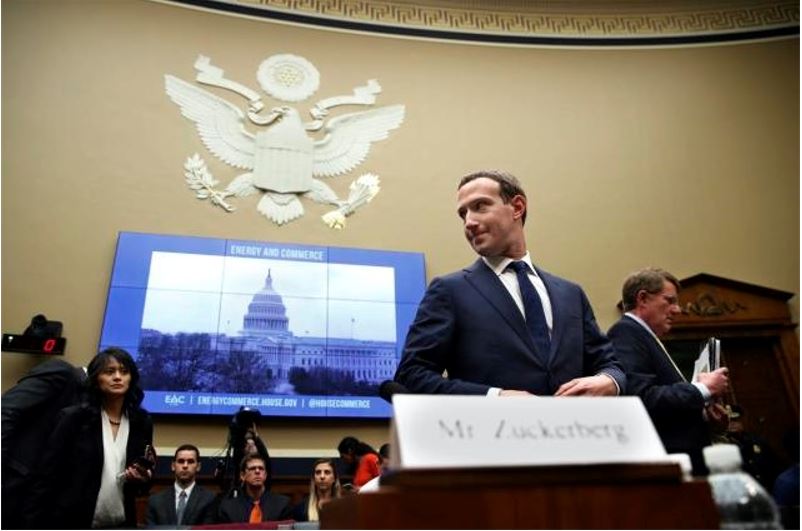3 ways Congress could hold Facebook accountable for its actions

Congress has asked many questions of Meta CEO Mark Zuckerberg but has done little to regulate Facebook. AP Photo/Jacquelyn Martin
Written by:
- Anjana Susarla Professor of Information Systems, Michigan State University
- Bhaskar Chakravorti Dean of Global Business, The Fletcher School, Tufts University
- Ryan Calo Professor of Law, University of Washington
Facebook may have changed its corporate name to Meta Platforms, but that won’t end its troubles – nor efforts to rein in the social media company’s business practices. Lawmakers are pondering new ways to regulate Facebook, whose CEO, Mark Zuckerberg, wrote in 2019 that he welcomed new “rules governing the internet.” With that in mind, we asked three experts on social media, technology policy and global business to offer one specific action the government could take about Meta’s Facebook service.
Let users control more of their data
Anjana Susarla, Professor of Information Systems, Michigan State University
Social media sites like Facebook are designed for constant interaction to engage users’ attention. To rein in Facebook, lawmakers must first understand the harm that results from algorithmic manipulation on these platforms. One thing Congress could do is make sure Facebook gives users more control over what data the company collects about them and why.
Most people who use Facebook are unaware of how algorithmic recommendations affect their experience of the platform and thereby the information they engage with. For example, political campaigns have reportedly tried to manipulate engagement to get more traction on Facebook.
A key aspect of providing such transparency is giving users greater access to and control over their data, similar to what’s proposed in California’s Consumer Privacy Act. This would allow users to see what personal data Facebook collects about them and how the company uses it. Many people don’t realize that Meta has the ability to make inferences about their political preferences and attitudes toward society.
A related issue is data portability tools and rights that allow users to take the data, including photos and videos, that they shared on Facebook to other social media services.
Providing users with more control over their data will go a long way in ensuring independent accountability and oversight of Facebook’s operations.
Mandating transparency
Ryan Calo, Professor of Law, University of Washington
In October 2020, Facebook sent a cease-and-desist letter to New York University researchers. The researchers were investigating the spread of misinformation on Facebook through political ads. The company told NYU that scraping its platform violated Facebook’s terms of service, and it threatened “additional enforcement action” should the practice continue. In August 2021, Facebook terminated the accounts of two researchers and cut off NYU’s and its partners’ access to its political ad repository.
Companies like Meta are not exactly forthcoming about the problems on their platforms. The public hears about issues like misinformation and bias largely through the efforts of researchers, journalists and internal whistleblowers.
Congress holds the power to stay Meta’s hand when it comes to threatening legal action or blocking accountability research. Congress could, for example, add a research exemption to the Computer Fraud and Abuse Act, which would shield researchers from the threat of lawsuits for using data not explicitly authorized by a social media company, or protect employees from retaliation.
Congress could go further still: It could mandate transparency. Nothing about free speech doctrine or platform immunity prohibits the government from imposing auditing or reporting requirements for social media. The Federal Reserve embeds regulators in national banks.
Why shouldn’t Meta — a company with a US$900 billion market capitalization and ambitions to spawn a metaverse — have to open its operations to scrutiny?
An alternative approach to making Meta pay
Bhaskar Chakravorti, Dean of Global Business, The Fletcher School, Tufts University
I have a pragmatic suggestion for what the government might do about Meta.
When New York Times columnist Farhad Manjoo recently posed this question to experts, they came back with numerous solutions. Ultimately, Manjoo concluded that with the deep political divide in Congress, “doing nothing may be the likeliest outcome.”
I, too, agree it’s the most plausible scenario. Nevertheless, one fact is incontrovertible: Meta is under pressure right now, and the government can use this leverage to extract immediate benefits for society regardless of what happens down the road.
There is a larger problem than big tech’s lack of accountability: Almost half of all Americans cannot use the internet at broadband speeds. This is unacceptable in a post-pandemic world, where high-speed internet has proved essential. Broadband internet is also unaffordable for many.
Even the $65 billion earmarked for broadband in the infrastructure bill just approved by Congress isn’t enough to close America’s vast digital divide. My Digital Planet research team at Tufts has estimated that the true cost of closing the infrastructure access gap is $240 billion – leaving a $175 billion shortfall.
Lawmakers could use the stick of regulation to get the company to agree to blanket the nation with broadband. Meta already has two programs it could use to close gaps in both rural and urban areas.
At the same time, Congress could levy a tech tax on digital ads sold by Facebook and other social networks to subsidize telecommunication service in high-cost areas.
By giving more people access to high-speed internet, Meta will benefit by increasing the number of people who could eventually join its metaverse. While that may seem counterproductive, the ills of Facebook are outweighed by the greater ills of large swaths of the U.S. with people unable to use the internet for essential services because we couldn’t raise enough money to close the gap.
Published with permission from TheConversation under a commons license.






 Afrikaans
Afrikaans Albanian
Albanian Amharic
Amharic Arabic
Arabic Armenian
Armenian Azerbaijani
Azerbaijani Basque
Basque Belarusian
Belarusian Bengali
Bengali Bosnian
Bosnian Bulgarian
Bulgarian Catalan
Catalan Cebuano
Cebuano Chinese (Simplified)
Chinese (Simplified) Chinese (Traditional)
Chinese (Traditional) Corsican
Corsican Croatian
Croatian Czech
Czech Danish
Danish Dutch
Dutch Esperanto
Esperanto Estonian
Estonian Filipino
Filipino Finnish
Finnish French
French Frisian
Frisian Galician
Galician Georgian
Georgian German
German Greek
Greek Gujarati
Gujarati Haitian Creole
Haitian Creole Hausa
Hausa Hawaiian
Hawaiian Hebrew
Hebrew Hindi
Hindi Hmong
Hmong Hungarian
Hungarian Icelandic
Icelandic Indonesian
Indonesian Irish
Irish Italian
Italian Japanese
Japanese Javanese
Javanese Kannada
Kannada Kazakh
Kazakh Khmer
Khmer Korean
Korean Kyrgyz
Kyrgyz Lao
Lao Latin
Latin Latvian
Latvian Lithuanian
Lithuanian Luxembourgish
Luxembourgish Macedonian
Macedonian Malagasy
Malagasy Malay
Malay Malayalam
Malayalam Maltese
Maltese Maori
Maori Marathi
Marathi Mongolian
Mongolian Myanmar (Burmese)
Myanmar (Burmese) Nepali
Nepali Norwegian
Norwegian Pashto
Pashto Persian
Persian Polish
Polish Portuguese
Portuguese Punjabi
Punjabi Romanian
Romanian Russian
Russian Samoan
Samoan Scottish Gaelic
Scottish Gaelic Serbian
Serbian Sesotho
Sesotho Shona
Shona Sindhi
Sindhi Sinhala
Sinhala Slovak
Slovak Slovenian
Slovenian Somali
Somali Spanish
Spanish Sundanese
Sundanese Swahili
Swahili Swedish
Swedish Tajik
Tajik Tamil
Tamil Telugu
Telugu Thai
Thai Turkish
Turkish Ukrainian
Ukrainian Urdu
Urdu Uzbek
Uzbek Vietnamese
Vietnamese Welsh
Welsh Yiddish
Yiddish Yoruba
Yoruba Zulu
Zulu